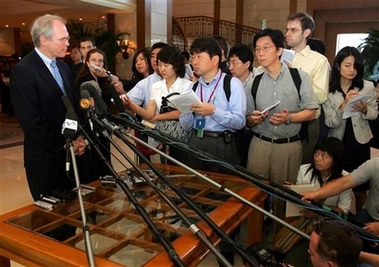Hill: Glitch holding up NKorean transfer
(Reuters)Updated: 2007-06-16 17:09
 The top U.S. nuclear negotiator Christopher Hill, left, speaks to journalists after a breakfast meeting with Chinese Vice Foreign Minister Wu Dawei in Beijing in this September 6, 2006, file photo. [AP] |
Hill did not provide details of the technical problem, which he said the U.S. side first learned about from the North Koreans. He said it should be resolved Monday, or possibly as early as Saturday.
"I heard that the money was transferred, it's in Russia, and they're having some technical problems in getting it to the bank where the actual North Korean accounts are," said U.S. Assistant Secretary of State Hill, speaking to reporters at an Asia Society conference in Mongolia.
Once the North Koreans get the money, "we hope they will get on with what they need to do in terms of implementing the February agreement," Hill said.
North Korea has refused to act on its February pledge to disarm until it gets access to $25 million once frozen in a U.S.-blacklisted Macau bank. The U.S. accused Banco Delta Asia of helping North Korea's government pass fake $100 bills and launder money from weapons sales.
Claiming the financial freeze was a sign of Washington's hostility, North Korea boycotted international nuclear talks for more than a year, during which it conducted its first-ever atomic bomb test in October.
Although the timing of the next round of six-party disarmament talks is up to the host country, China, Hill said he expected them to be held in early July. However, he said it was important for North Korea to fulfill its obligations for the first phase of the disarmament agreement before the next meeting.
"I would anticipate we would want these first phase items to be done before we have a six-party meeting because we don't want to have a six-party meeting to discuss what we've discussed before," Hill said. "I'm not making that some kind of condition, I just think it's a logical sequence of events."
The first phase of the agreement requires North Korea to shut down its main nuclear reactor and allow U.N. inspectors back into the country within 60 days. North Korea kicked out the International Atomic Energy Agency inspectors in December 2002.
In return, it is to receive aid equal to 50,000 tons of heavy fuel oil from the other participants in the nuclear talks.
In the next phase, North Korea is required to make a complete declaration to the IAEA and the other parties about its nuclear program, which then is to be dismantled.
To win the North's promise to start dismantling its nuclear program, the U.S. agreed to allow the money to be freed. But the transfer has taken months as the North insisted that it be sent electronically to another bank, apparently to prove the money is now clean.
Several media reports have said the money would be sent through the U.S. Federal Reserve branch in New York before arriving in North Korean accounts in Russia's Far East. Hill did not confirm the exact route of the money transfer but said, "One thing I know is that it's not in Macau, it's not in the U.S., it's in Russia."
On Thursday, Macau's chief finance official said the money had been transferred from Banco Delta Asia, but it remained unclear if the entire amount had moved or whether it reached its destination. Officials knowledgeable about the transfer have said more than $23 million was involved but that the transaction was not completed.
Still, it was not clear whether the resolution of the banking dispute would bring about progress in North Korea's nuclear disarmament.
The country warned Friday that it might increase its "self-defense deterrent," a term it usually uses for its nuclear program, raising concerns that the regime might be trying to find another reason to drag its feet.
"The U.S. is claiming that it is building a global missile defense system to protect against missile attacks from our nation and Iran. This is a childish pretext," the North's Foreign Ministry said in a statement carried by the official Korean Central News Agency. "We cannot but further strengthen our self-defense deterrent if the arms race intensifies because of the U.S. maneuvers."
Besides the U.S., the two Koreans and Russia, other participants in the
six-party talks are China and Japan.
|
||
|
||
|
|